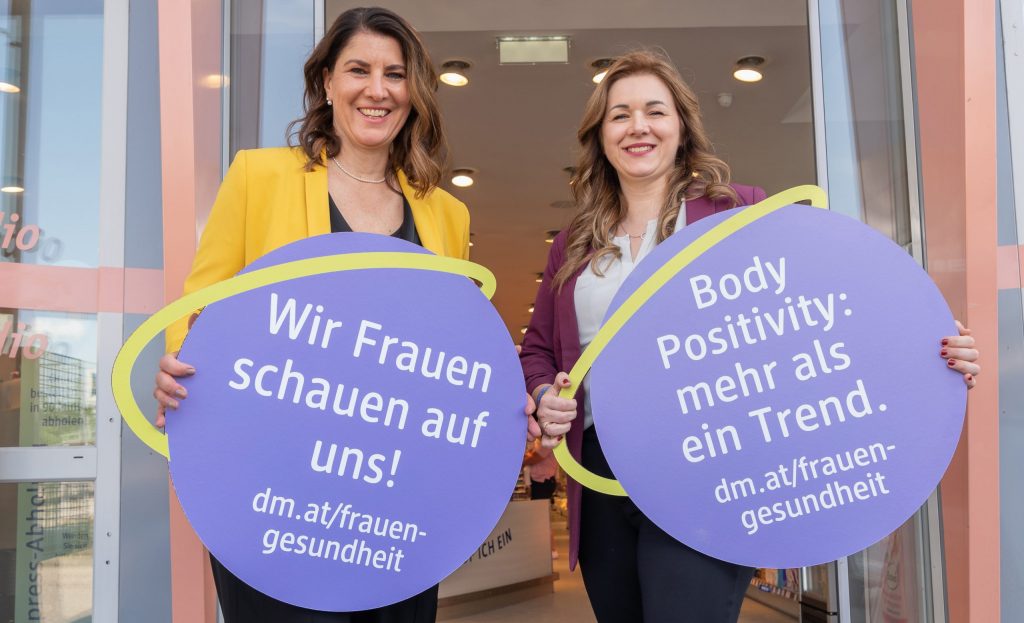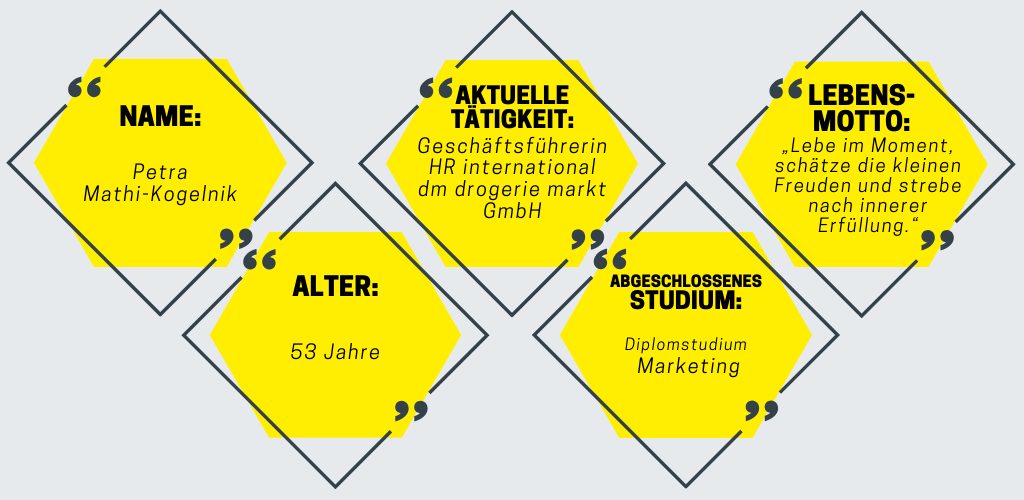As part of our “Graduate of the Month” series, we had the pleasure of speaking with Petra Mathi-Kogelnik about her time at university. From her beginnings as a regional manager at dm drogerie markt GmbH to international project management and eventually becoming an HR executive, she offers us insights into her successful career and the challenges of modern human resource management. In our interview, find out why personal development is just as important as professional expertise and what strategies dm employs to be regarded as a top employer.
Why did you choose the study programme at the Department of Marketing & Sales at CAMPUS 02 University of Applied Sciences back then?
At that time, I completed the first part of my business administration studies and was very dissatisfied with the purely theoretical content. I longed for more practical relevance, and the course was difficult to reconcile with a job, but I really wanted to work. Additionally, I was passionate about two areas during my studies: marketing and internationality, so it was clear to me that I absolutely wanted to study Marketing & International Business (as it was called back then) and transfer to the university of applied sciences.
When you think back to your studies, what do you particularly fondly remember??
I fondly remember the particularly close-knit community that developed among us students. This was a clear advantage of the university of applied sciences, where we grew not only individually but also as a group. Together, we experienced highs and lows, and it was precisely the diversity of our backgrounds – whether related to our biographies, life stages, professions, or areas of expertise – that greatly enriched our community. This diversity was reflected not only in our learning but also in our collaboration on projects and our ability to find solutions from various perspectives.
I also have special memories associated with the lecturers at the university of applied sciences as well as the external guest speakers. The hours spent with them were characterised by a respectful and egalitarian exchange, accompanied by numerous discussions. I always felt that it was genuinely important to them to support us well during these challenging four years alongside our full-time jobs.
What experiences have you gained in your professional career, and how have they shaped you?
After completing my studies, I joined dm drogeriemarkt as a regional manager in Styria. There, I was able to immediately apply and deepen the diverse insights and extensive knowledge from my studies in the retail sector. After two years, my dream of working internationally came true when I went to Italy for two years to lead a project for dm. This experience was particularly valuable as I gained insights into all areas of a retail company, including expansion, sales, finance & controlling, marketing & purchasing, employee management, and logistics. After returning to Austria, I was promoted to the executive board and have been working as a managing director since 2006.
During my time as department head for Austria, I managed our 11 subsidiaries in Southern and Southeastern Europe. At the same time, I was responsible for the sales region in Styria, which comprised 54 retail and service branches and around 700 employees. Since 2021, I have been the managing director responsible for Austria and our 11 subsidiaries in the areas of international legal services, income structuring & additional services, culture & development, brand collaboration, international recruiting, renewal management (project, requirements, process management), and employee data management.
The time since the COVID-19 pandemic has fundamentally changed the HR sector and presented us with entirely new challenges. At times, it felt as though we had landed in a continuous course of study, as we suddenly had to engage with topics that previously seemed less relevant. HR departments have evolved from a purely administrative role to strategic functions, with areas such as organisational development and succession planning becoming increasingly important.
Demographic change and the shortage of employees have transformed talent management, placing a greater focus on the attraction and retention of employees. This encompasses topics such as employer branding, targeted recruiting, diversity, inclusion, talent development, and improved succession planning to ensure that qualified employees remain with the company in the long term.
A positive employee experience is becoming increasingly crucial and begins right from the search for employees, extending through onboarding and the working environment, to development and offboarding. Technology and digitalisation play an ever-greater role, particularly AI, which enhances HR systems, cloud solutions, AI self-service tools, and people analytics, increasing efficiency and enabling improved process automation.
Data analysis and people analytics will receive an even greater focus in the coming years, including for corporate governance. International comparisons and compliance with legal requirements, such as those in ESG reporting, will become increasingly important.
All these topics have come to stay.
What strategies does dm pursue to position itself as a good employer in different countries, and what contribution does Marketing & Sales make to this?
For dm, it is essential to pursue a strategic alignment across all connected countries. This allows for synergy effects to be utilised and ensures a consistent presence as an employer in the public eye.
One commonality regarding positioning as an employer that connects all countries is the claim "Work is another life." The essence of this claim is to create a work environment where employees feel comfortable, can develop their skills, and engage in meaningful activities. It is essential that work is not just a means to an end, but a source of personal fulfilment and growth, as well as a contribution to a better future. This is a promise made to both existing employees and prospective employees.
The claim and its execution provide the framework in all countries for how dm presents itself both internally and externally as an employer. The specific design of the communication is the responsibility of the individual countries, allowing for the uniqueness of each country to be taken into account and enabling it to be infused with regional narratives.
The brand of dm plays a significant role in how dm is perceived as an employer. Experiences at the point of sale (both in-store and online) can influence how dm is viewed as a whole—including its perception as an employer. It is important to remember that customers are not only buyers but can also be potential employees. Therefore, their experiences can have a direct impact on how attractive dm appears as an employer. For this reason, employer branding and marketing & sales work closely together to ensure that the overall image of dm is aligned.

To what extent did your studies support you in realising this career path?
I am sure that my personal core competencies were greatly enhanced by my studies at FH CAMPUS 02.
I bring with me skills in international HR and project management, intercultural competence, implementation strength, entrepreneurial thinking, creative problem-solving, social and communication skills, energy, commitment, and enthusiasm. Through this course, I also learned to find solution-oriented approaches and to view topics "out of the box" and from different perspectives.
Where do you see the future challenges for Marketing & Sales? Which topics should be particularly emphasised in education?
The pace of development in the economy in general, and in retail in particular, is accelerating rapidly. A solid foundational education remains an important basis, but specialised knowledge has an increasingly shorter shelf life. What is needed are individuals who have learned to make connections, think in a networked manner, take responsibility, and make decisions. Those who have already gained initial experience in leading people or teams in project groups or other settings and feel comfortable in this role. They should possess the personal skills to find the right balance between the human needs of colleagues or customers and economic requirements. At dm, we place equal emphasis on professional content and personal development in our training and education. The latter is something that should also have a place in university studies.
I advise students...
Continuously motivating each other when things become challenging. For me, the key to success was fundamentally the community among the students and the positive, appreciative relationship with the lecturers.
A few words with Petra:
- From my time at university, I still have…
… friendships, many shared experiences with colleagues, a good network (still in touch with the university) Kotler: Principles of Marketing ?
… a strong connection to FH CAMPUS 02. We even jointly developed the Academic Course in Retail Management.
- Who inspired you?
Wonderful lecturers from the industry and fellow students from various sectors inspired me with their perspectives and experiences.
- If I were to study again, I would…
essentially do nothing differently, except start studying at the university right away.
My studies in 4 words:
Best decision of my life (referring to the education).

